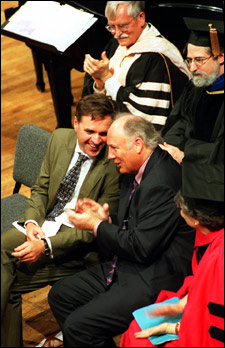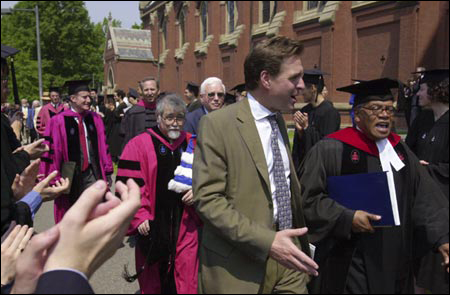Ferguson: Empire without apology
‘You have become us,’ says British historian at PBK

British Prime Minister Tony Blair’s dogged support for President Bush’s Iraq war seems to many to reaffirm the “special relationship” that has existed between Britain and the United States ever since the two countries patched up their differences over the American Revolution.
“Don’t count on it,” warned historian Niall Ferguson in a talk on Tuesday (June 8) at the Phi Beta Kappa Literary Exercises in Sanders Theatre.
Ferguson, a prolific and controversial scholar who will join the Harvard History Department in 2004-05, provided the oration at the 223rd Phi Beta Kappa Literary Exercises. David P. Smith was this year’s poet.
Ferguson did not dispute the existence of America and Britain’s special relationship. In fact, in his opening remarks he downplayed the significance of the American War of Independence, calling it “a minor interruption in an otherwise cordial relationship.” Considering that conflict, the amity and cooperation between the two countries has been remarkable, he said. “In a world of interminable blood feuds, ours was a very short spat.”

Moreover, in its essential outlook and national character, the United States “remains indelibly a British creation,” Ferguson said. Despite its division between church and state, America continues to define itself by the doctrines of evangelical Protestantism that formed the spiritual heritage of its earliest settlers. Americans still see themselves as a chosen people driven by Manifest Destiny, nationalism, and the work ethic, a set of values “terribly familiar to historians of the British Empire.” America even finds itself waging wars on the same battlegrounds (Asia, the Middle East) in which the defenders of the British hegemony struggled.
The problem is that as America becomes more like Britain, Britain is becoming more Europeanized, undergoing a marked decline in religious faith, a growing skepticism about patriotism, and developing a more relaxed, more European attitude toward work. The transformation may help to explain the current unpopularity among citizens of the United Kingdom of Blair’s support for the Iraq War.
“The Americans are the British and the British have become Europeans,” Ferguson said. “Isn’t it lovely – you have become us, even as we have ceased being us.”
Ferguson, whose latest book, “Colossus: The Price of America’s Empire” (2004), affirms the necessity of world domination by an enlightened superpower and urges the United States to unashamedly assume that role, cautioned his audience that in the future America will pretty much have to go it alone.

“The reality of our predicament is that the U.S. will not be able to count much longer on the special relationship.”
But the United States may not need that much help. After all, knowledge is power, he said, and the United States, by virtue of institutions like Harvard, which Ferguson called “the best university in the world,” is blessed with a superabundance of that commodity.
He ended his talk with a frank admission of his own motives in coming to Harvard and an exhortation to the graduates seated before him.
“I come to you not as an emissary from the British Empire, but as just another European immigrant attracted by this institution’s astonishing accumulation of knowledge. May you all use the knowledge you have gained here.”
Smith, a professor in the creative writing program at Johns Hopkins University and the author of 18 books of poetry and several of prose, read a composition titled “Little Boat, Unsalvaged.” He said that the poem dealt with “the oldest of poetic subjects, taking a walk.”
The poem describes coming upon a “dead boat,” sunk in the shallow water, a common sight in the coastal Virginia area where Smith grew up. The wrecked, decaying vessel (“a girl’s/name time rubbed from a tide-canted stern”) contrasts with the vitality and excitement that once must have been part of the boat’s existence:
… moments of love with the cooler
beer-stuffed, shells opening, flesh brine-perfect, still pumping.
Somewhere charts know, we’re shoving out, so happy we weep.
And yet, in the present, all that life is gone, leaving only the remains of a once-cherished artifact, but one which even in its moribund state still has power to enchant:
How quietly, then, it happened, salt coating us, sun like fingers
Raking the cheeks, the unsalvaged hull alive with swirls of stars.
The Exercises were also the occasion for the announcement of the Phi Beta Kappa Teaching Prizes. This year they went to Carl Pearson, lecturer in the history of science; Salil Vadhan, assistant professor in computer science; and Bertrand Halperin, the Hollis Professor of Mathematics and Natural Philosophy.
Six individuals were made honorary members of Phi Beta Kappa. They included Ferguson; Smith; Harvard President Lawrence H. Summers; Philip A. Kuhn, the Francis Lee Higginson Professor of History and of East Asian Languages and Civilizations; Susumu Kuno, professor of linguistics; and David Maybury Lewis, professor of anthropology.
Harvard’s chapter of Phi Beta Kappa, founded in 1781, is the oldest uninterrupted chapter of the organization in the nation. The Radcliffe chapter was founded in 1914, and the two were merged in 1995. Originally held in Holden Chapel, the Phi Beta Kappa Exercises have taken place in Sanders Theatre since 1876.




